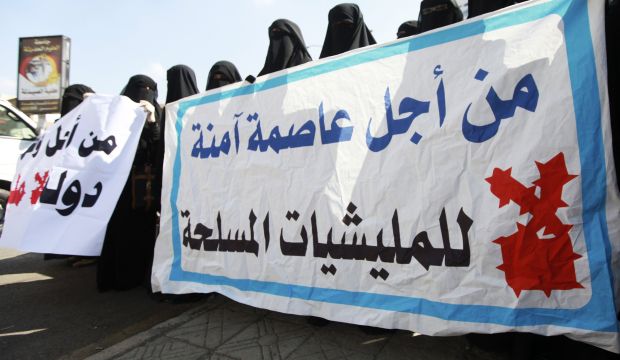
Protesters hold banners as they demonstrate against the deployment of armed militias of the Shi’ite Houthi movement in Yemeni cities, in Sana’a, Yemen, on November 1, 2014. (Reuters/Mohamed Al-Sayaghi)
Sana’a and Al-Hudaydah, Asharq Al-Awsat—The Shi’ite Houthi movement continued to target the offices of rival political and religious groups over the weekend, taking over the Yemeni branch of the Muslim Brotherhood’s headquarters in the central city of Ibb after destroying several of the group’s offices in the capital Sana’a with explosives, according to eyewitnesses.
The eyewitnesses also said armed members of the group had killed four guards posted at the building in their attempt to take it over by force, amid fighting in other governorates such as Dhammar between the movement’s armed members and members of other rival groups.
Meanwhile, local sources in Sana’a told Asharq Al-Awsat large parts of the capital remained under the control of the group’s armed “popular committees” amid a complete absence of security forces.
This comes as Yemen’s main political factions agreed on Saturday to task new Prime Minister Khaled Bahah and President Abd Rabbuh Mansur Hadi with forming a new government, following an ultimatum announced by the Houthi movement on Friday that it would unilaterally form a “national salvation government” if a new government was not established within ten days.
In a statement released on Saturday, the signatories to the agreement, which included the Houthi movement, said they had asked the president and prime minister to form “a competent government . . . committed to the protection of human rights, the rule of law, and ensuring impartiality in managing the affairs of the country.”
The timeframe for the new government to be finalized was not mentioned in the statement, but sources told Reuters this should follow within a week.
This echoed another statement released earlier on Saturday by the countries of the Gulf Initiative, which “stressed the importance of a qualified government which enjoys the qualities of integrity and impartiality, with a commitment to promoting human rights and the rule of law in order to protect the national interest.”
It also said the new government “should include the presence of qualified female and youth members,” and that “all sides must work together to form a government with the express intention of fulfilling the aspirations of the Yemeni people.”
In the statement, the Gulf Initiative members—which include the five permanent members of the UN Security Council, a number of Gulf Cooperation Council members states, and the European Union—also called on the Houthi movement to stop its “continued control of military and national activities, and their takeover of different regions [of the country], and to return all military weapons and equipment seized back to the state.”
Meanwhile, on Saturday a large demonstration was held in the western port city of Al-Hudaydah by the secessionist Al-Hirak movement to protest against the presence of the Houthis in the city and in the western coastal area of the country known as the Tihamah region.
Speaking to Asharq Al-Awsat, the group’s regional head of legal affairs, Taha Al-Harad, said the demonstrators wanted to “expel armed members of the Houthi movement, as well as all the group’s militias, from Tihamah.”
He said the demonstrations were also a call to the Yemeni state, along with all its institutions, to “impose its will” in Al-Hudaydah, adding that “the Al-Hirak movement in Tihamah, in addition to its rejection of the presence of militias in the area, also rejects weakening the role of state institutions [in Yemen], since we support a civil society.”
Harad said the group would be escalating its protests in the coming days, adding that it would be holding “15 demonstrations” as well as “announcing a full political program,” and that the group rejected the press conference held by the Houthi movement on Friday which was attended by former figures from the regime of ex-president Ali Abdullah Saleh, and which was held at the request of Houthi movement leader Abdul Malik Al-Houthi.
Harad said the Al-Hirak movement called on all signatories in the National Dialogue Conference agreement to “safeguard the [religious and cultural] identity of the Tihamah region,” also calling on President Abd Rabbuh Mansur Hadi “to expel all Houthi militias from Al-Hudaydah and all the country’s provinces.”
The founder of the Al-Hirak movement in Tihamah, Khaled Khalil, told Asharq Al-Awsat that the Houthis’ activities in the Tihamah region were “the same as those practiced by the Imamate [Yemen’s former Zaydi–Shi’ite Muttawakilite Kingdom], who entered the province with weapons.”
He said the presence of the Houthi movement in the region “added to the suffering” of the people there, “on top of the marginalization they [the people of Tihamah] have been enduring for over a century.”
He added: “The people of Tihamah will not stay silent regarding this armed invasion [by the Houthis of the region] nor the Houthis’ armed provocations [of people in the region]. We are making our voices heard through escalating these large demonstrations protesting the presence of the Houthi movement in our region . . . because the Houthis want to completely take over the Al-Hudaydah province and the entire Tihamah region by force, in light of its strategic position on the Red Sea and Hudaydah’s port, which is the second-largest in Yemen, as well as the Bab El-Mandeb strait.”
Wael Hazam contributed reporting from Al-Hudaydah
